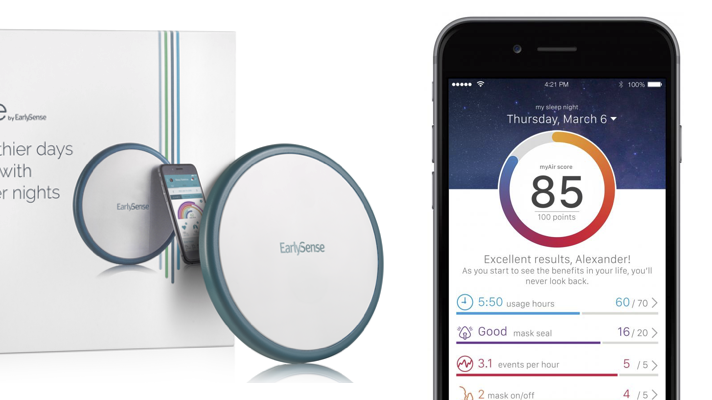 Two digital health companies focused on sleep published data this week that highlighted the efficacy of their respective platforms, bringing continued attention to the space after a CES week where sleep was a major focus. A whitepaper by Pricewaterhouse Cooper showed that ResMed’s myAir improved CPAP adherence while a paper in the Journal of Clinical Sleep Medicine found that EarlySense’s new consumer system EarlySense Live performed comparably to polysomnography.
Two digital health companies focused on sleep published data this week that highlighted the efficacy of their respective platforms, bringing continued attention to the space after a CES week where sleep was a major focus. A whitepaper by Pricewaterhouse Cooper showed that ResMed’s myAir improved CPAP adherence while a paper in the Journal of Clinical Sleep Medicine found that EarlySense’s new consumer system EarlySense Live performed comparably to polysomnography.
ResMed’s myAir is an app that launched last year allowing CPAP users to track their treatment via an app and giving them access to their daily sleep patterns and coaching tips. The new whitepaper looked at data from over 23,000 patients in Germany and the United Kingdom, 1,800 of whom used myAir.
The study found that myAir patients use their device an average 46 minutes longer per night compared to other patients. Additionally, the average adherence to CPAP treatment for new patients in their first week of treatment was 76 percent for myAir patients, compared to 71 percent for other patients.
"We know that around half of patients are not compliant with their CPAP treatment; this is a major concern for sleep treatment professionals,” David Jones, Sleep Manager at University Hospital of South Manchester in the UK, told PwC. “The effects of poor treatment adherence are profound, not only because of the impact on patients' quality of life, but also in terms of an increased number of accidents and emergency visits, hospitalizations and the resulting financial burden that this places on healthcare systems. These latest findings confirm that enabling patients to track and improve their CPAP device usage is an important step towards long-term compliance and better patient outcomes.”
The EarlySense paper included just 63 subjects, but measured them simultaneously with EarlySense’s contact-free sensor, which fits under a user’s mattress, and polysomnography, the gold standard of sleep studies which requires hooking up a number of electrodes and sensors to the patient’s skin.
The study found 92.5 percent agreement between EarlySense Live and polysomnography.
"The results of this study confirm that the tested sensor is highly accurate in detecting sleep and wake states relative to polysomnography," Asher Tal, founder of the Pediatric Pulmonary Unit and Sleep Center at Soroka Medical Center in Israel, said in a statement. "Even under the most challenging conditions, with the subject sharing his or her bed with a partner, the sensor was able to accurately detect individual vital signs and sleep cycles in a non-invasive manner. This technology is well suited for continuous observation of patients in their natural environment.”














